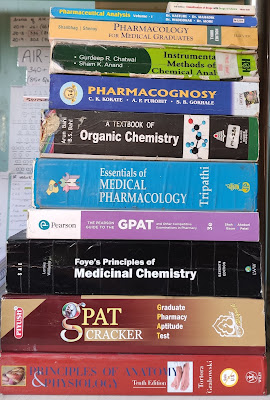7. Studying and making notes
If you’re of
the opinion that making notes is a tedious task, an unnecessary step that is
not needed when you can directly read and study and remember from textbooks,
then welcome to this post where I’ll share a different perspective.
I have
discussed this briefly in my previous post where I spoke about how to use a reference
book. Once you have gone through the material in references and properly
understood the topic, then comes the next step, making notes.
The gist of
this post is then when you “study” a certain topic, you will be using more than
one book, teacher’s ppts, senior's notes, YouTube video and a bunch of other
tools to properly understand it. You will take a few days to understand the
topic and you will also retain it only for a few days. If you do not make your
own notes at this stage, when you need to revise that topic a few months later
then you are not going to retain it with the same efficiency as you did before.
If you wish to revise it again the process is going to be similar to starting
over from scratch and going through all those resources again which is a
serious waste of time. If you do have your own notes the process is going to be
as simple as going through a few pages of your own handwritten notes.
My original notes are with the current Final Year 2021 batch at SKNCOP and you can borrow them and xerox if you want my notes.
Alternatively, you can use the scanned copies of my notes by downloading them from this GDrive folder:
https://drive.google.com/drive/folders/1hqW0WCVHaibHz3KtlS9TgGWkP_ARD-ZP
 |
| My notes made over a period of 7 months |
Use different notebooks for each subject and label them with the name of the subject so that you can organize them. Update the index with the title of the topics as and when you progress through to make your task easier to find them later on.
References are
going to be your go to base to start off your note making process because that
is what you will be majorly studying from. Your notes should be a summary of
what you understood from that topic when you went through the reference. Do not
copy-paste words and sentences in your notes unless you understand each and
every word that you are writing. Try to also write and note the things you
learn from other resources in your notes – whatever images you referred from
the internet, some theory you read in a different book, diagram you used from
the teacher’s ppt and so on.
Mnemonics are going to be the most important trick that I can give you for making notes because these help during revision. Whenever you find a classification, a list of names, etc that you have to remember by heart then always try to find a mnemonic because there are loads out there. I have used mnemonics for:
- Remembering all the schedules under D&C Act and what do each of them stand for
- Forms no. and their uses under D&C Act
- Remembering the law name and year of enactment
- Under Pharmacognosy to remember stomata types, calcium oxalate crystals etc.
- 90% of all the drug classifications we study under Pharmacology
- Side effects, uses and major properties of drugs in Pharmacology
- The lists of various types of detectors, sources etc in Analysis
- Lists of excipients, processes, equipments in Pharmaceutics and PP
You will easily find
loads of mnemonics for medical subjects like HAP, Pathophysiology, Pharmacology, Biochemistry, Microbiology if you
google them or on YouTube – search for “XYZ mnemonic” and you will find them.
Eg: Antimalarial drug classification mnemonics
In case you do
not find a mnemonic on the internet then make your own ones! Arrange the lists
in a way that the first alphabet of each term can make a word that is easy or funny for
you to remember:
Eg: IR sources – “MINGT” – Mercury arc, Incandescent wire, Nerst glower, Globar source, Tungsten lamp
 |
| MINGT |
 |
| SURAT |
You can also
make funny associations with various words so that you remember important details
Eg: “Gobar Sisica” – To remember that Globar source is made of sintered silica carbide rod
I retain the
important things by making mnemonics or funny stories surrounding them. When I used
to revise a certain topic, I used to always revise my mnemonics too so that I never lost
track of them.
Making notes
does seem like a tedious task but it is a very important one. Try to include as
much information as you can when you make your notes because you can always cut
down stuff and make it short later on during revision. Making notes is also a skill
that you will learn, develop and improvise over time once you get involved.
If you make your own notes, then you will have a notebook where you have put in all these efforts and noted these important details. These notes will play a key role during your revision in Dec-Jan.
During the last few months, you will not have the time to go through references and read big fat books again so instead utilize all the time you get from June to November to make as many notes as you can!



Brother please provide these notes in gdrive so that we can compare it with our notes and add extra points in our notes.
ReplyDeleteI have uploaded my notes at this link:
Deletehttps://drive.google.com/drive/folders/1hqW0WCVHaibHz3KtlS9TgGWkP_ARD-ZP
(I'll paste the link in the post itself for easy referencing)
It is not opening Taher sir
ReplyDeleteI have re-checked and the link is working. Please copy the link and paste it in the browser
Delete